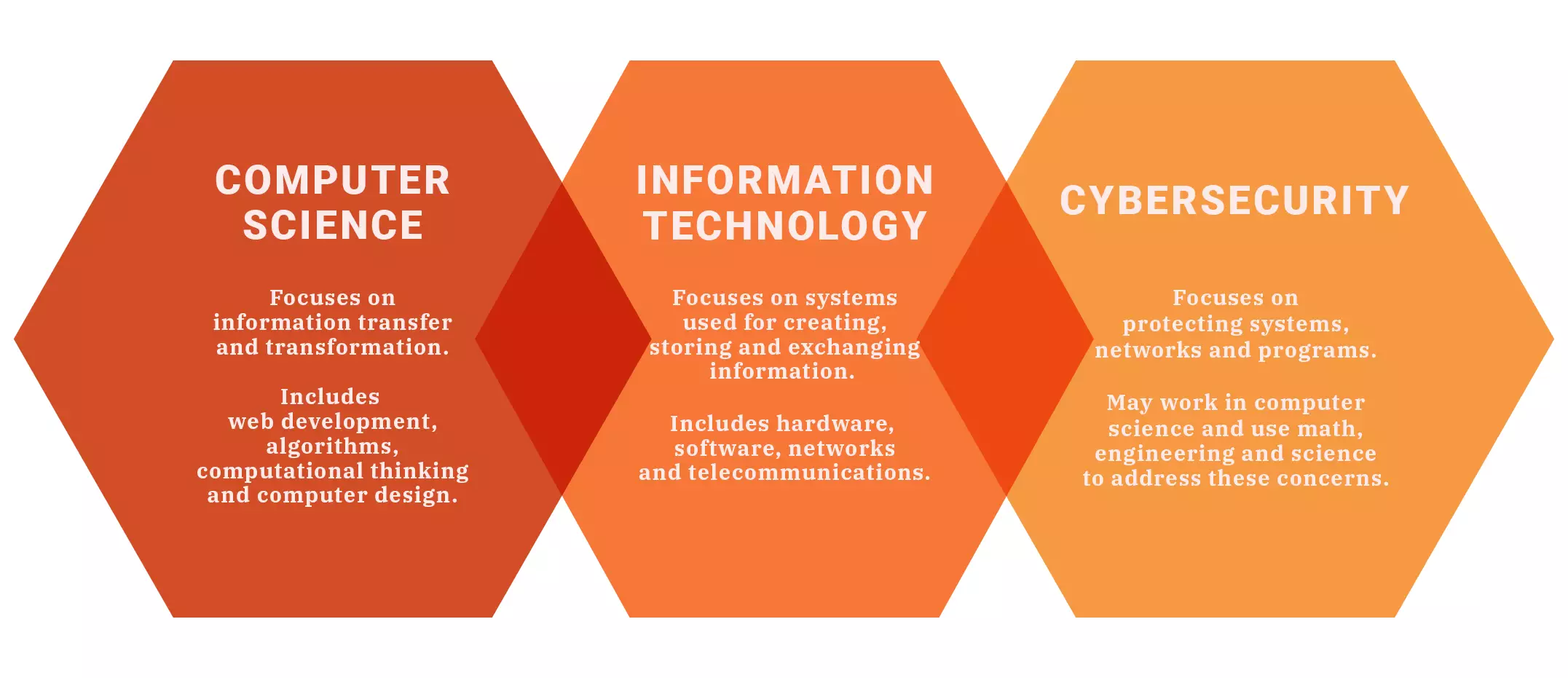
Written by Michael Feder

Reviewed by Kathryn Uhles, MIS, MSP, Dean, College of Business and IT
This article was updated on April 4, 2024.

Written by Michael Feder

Reviewed by Kathryn Uhles, MIS, MSP, Dean, College of Business and IT

Technology is a constant in many people’s lives. Whether during leisure time or at work, people interact with countless computer applications every day. It takes dedicated work from numerous professionals to create these applications before they get to your hands — and to keep them running smoothly.
If you’re passionate about technology and understanding how it works, you can learn more through flexible, online programs at University of Phoenix, where IT programs often focus on three key areas: computer science, information technology and cybersecurity.
The fields have similarities, but each is a distinct discipline. Here, we explain each field of study and what roles they encompass.
Computer science combines multiple disciplines, such as the study of algorithms, data structures, web development, computational thinking, abstraction of information and the design of computers. It’s the study of information transfer and transformation.
Computer science intersects with disciplines like math, engineering and even psychology. In addition, it offers a broad range of subdisciplines, like artificial intelligence (AI), database systems, security, human-computer interactions and graphics.
Why is computer science important? It plays a pivotal role in driving tech innovation. It’s the engine that powers technology breakthroughs and advancements, including:
Computer science is prevalent in various sectors of society, from healthcare and entertainment to finance and manufacturing. Computer science is used to create systems to handle vast amounts of data, solve complex problems and improve process efficiency.
At its core, computer science shapes technology’s future and the ways people interact with it.
A Bachelor of Science in Computer Science (BSCS) focuses on information technology hardware and software. Those who complete a degree in computer science, once in a role geared to their special training, may focus on programming. They may also conduct testing, which means they simulate various issues that might arise in real life to see if the device or program processes the request or solves the issue and continues to function normally.
In addition to a bachelor’s degree, computer science professionals can pursue additional certificates at University of Phoenix to fine-tune their expertise. These certificates include but aren’t limited to:
Certificates can take anywhere from 8 to 10 months to earn, but the core courses in each program teach valuable skills you can showcase to your current or future employer.
Careers in computer science are available in various industries, especially as the tech industry continues to grow. A BSCS can prepare you for several different roles in the industry, including:
The salary ranges are not specific to students or graduates of University of Phoenix. Actual outcomes vary based on multiple factors, including prior work experience, geographic location, and other factors specific to the individual. University of Phoenix does not guaruntee employment, salary level, or career advancement. BLS data is not geographically based. Information for a specific state/city can be researched on the BLS website.
Information technology (IT) refers to the systems that people develop to create, store, exchange and use information. This can include hardware, software, networks and telecommunications.
IT also explores how people use computers, mobile devices and the internet to store, retrieve, transmit and manipulate data.
Given IT’s broad scope, it is essential to modern life and touches sectors ranging from business and education to healthcare and entertainment.
University of Phoenix offers multiple degree pathways to enter the IT field, including a Bachelor of Science in Information Technology. Other potential options include a Bachelor of Science in Computer Science or a Bachelor of Science in Data Science.
For those who want to expand their expertise, the Master of Science in Data Science and Master of Information Systems programs offer two options for doing so. The latter program offers a competency-based track for professionals who have significant work experience and industry knowledge. Competency-based degree programs enable self-motivated and disciplined students to take four classes concurrently, move through the content at a self-governed pace and work with a faculty member as needed. This is a good opportunity for those who want to complete their degrees faster.
If you already have a degree in IT, certificate programs can augment your education and help expand your knowledge in a specific area. Certificates can be assets to showcase on your resumé.
If you’re thinking about entering the IT world and are exploring careers in information technology, it’s worth noting that employment in computer and information technology occupations is projected to have an estimated 377,500 open positions each year, according to BLS.
Information technology jobs are constantly evolving, but a bachelor’s degree in information technology can help prepare you for a role as an information systems manager or director.
Information systems managers and directors usually plan, coordinate and direct their organizations’ computer-related activities. Most of their work involves looking at the existing computer needs and recommending upgrades, but it can also involve ensuring security among IT programs. To become an IT systems manager, a bachelor’s degree in a relevant field is typically sought after. In May 2022, BLS reported computer and information systems managers earned between $97,430 and $239,200 annually.
Cybersecurity, and its subset, information security, is how people and companies protect their systems, networks and programs from digital attacks. Cyberattacks typically target sensitive information to access, change or destroy it. It’s a major tactic for extortion and interrupting business.
Cybersecurity is an extremely important field as more businesses move their infrastructure online. But businesses aren’t the only entities that need to worry about it. Private individuals and public organizations must also secure their data and information. That’s where cybersecurity professionals come in.
J.L. Graff, MBA, associate dean of UOPX’s College of Business and Information Technology, recognizes the importance of cybersecurity and the need for professionals in the field to combat cyberattacks. He cites, for example, how the healthcare industry alone had experienced more than 100 data breaches in just the first few months of 2024.
“Change Healthcare, a medical payment processing company, was a recent target of a suspected ransomware attack,” he says. “According to the American Hospital Association, it was ‘the most significant and consequential incident of its kind against the U.S. health care system in history.’ Industries across the globe are in dire need of cybersecurity professionals to protect information systems.”
In addition to bachelor’s programs, cybersecurity professionals can pursue certificates to expand their knowledge on specific topics. University of Phoenix offers several options for cybersecurity certificates, including:
Careers in cybersecurity allow professionals to apply their backgrounds in mathematics, science and engineering to solve cyber issues. They also prevent unauthorized access by individuals, state actors and those who seek to disrupt, exploit or otherwise wreak havoc.
As of May 2023, information systems security analyst earned between $69,210 and $182,370, with a median wage of $120,360, according to BLS.
BLS also reports information security specialist positions typically require a bachelor’s degree in a computer-related field and real-world work experience.
A cybersecurity expert may also work in a computer science field to assist teams with security precautions and analyses of new products for security flaws and other problems.
In addition to information security analyst jobs, a cybersecurity degree program can help prepare graduates for work in roles we’ve previously discussed, such as IT specialists and systems analysts.

Ultimately, earning your degree in cybersecurity, computer science or information technology can open pathways to a rewarding career in technology, whether that’s at a tech company or in another industry where you help an organization keep its IT platform running.
An information technology degree from University of Phoenix can help lay the groundwork for these careers. Here are just a few to consider:
To learn more about how our online degree programs can help you develop these skills within a flexible schedule, request information about an information technology degree today.

A graduate of Johns Hopkins University and its Writing Seminars program and winner of the Stephen A. Dixon Literary Prize, Michael Feder brings an eye for detail and a passion for research to every article he writes. His academic and professional background includes experience in marketing, content development, script writing and SEO. Today, he works as a multimedia specialist at University of Phoenix where he covers a variety of topics ranging from healthcare to IT.

Currently Dean of the College of Business and Information Technology, Kathryn Uhles has served University of Phoenix in a variety of roles since 2006. Prior to joining University of Phoenix, Kathryn taught fifth grade to underprivileged youth in Phoenix.
This article has been vetted by University of Phoenix's editorial advisory committee.
Read more about our editorial process.
Read more articles like this: